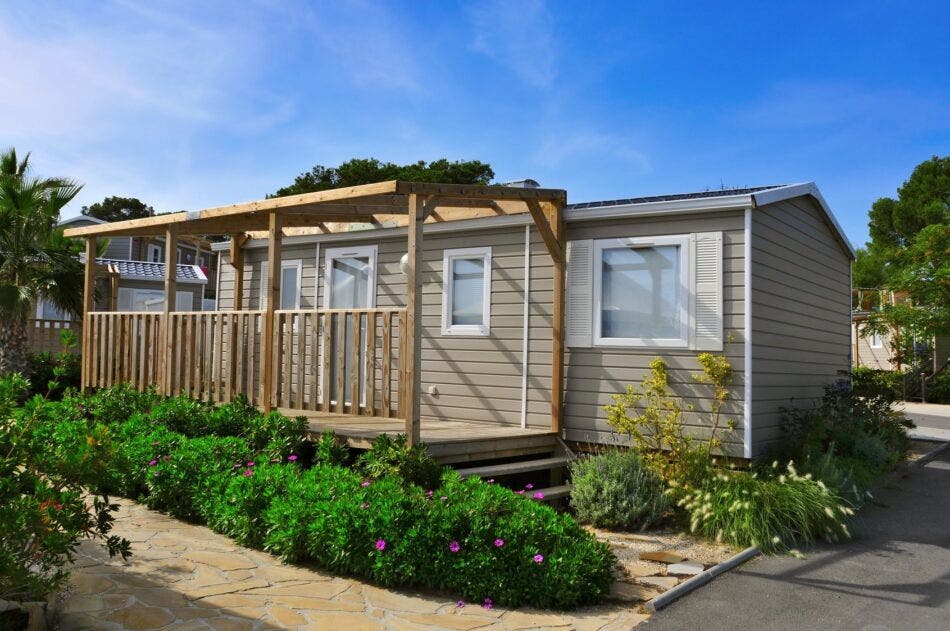Manufactured homes differ from traditional homes in that they are usually built at a separate location and shipped to their final destination. They often do not have a basement and are usually available in single, double-wide or triple-wide sizes. Their construction may differ from a traditional home in your area, as they are built to a separate code and may use different materials. Manufactured homes are an affordable choice for many homeowners, whether for a primary residence or a seasonal residence. Insuring it properly is essential and is similar to insuring a traditional home.
Manufactured Home Insurance
Like traditional home insurance, manufactured home insurance offers three main areas of protection: property, personal liability, and additional living expenses.
Property coverage will cover the repair or replacement of your manufactured home if it is damaged or destroyed by an insured peril up to your policy limit. This includes coverage for your home’s contents, your personal belongings, and outbuildings such as garages, sheds and decks. For example, if a wildfire damages your home and garage, your property coverage will cover repairs or rebuilding.
Personal liability covers expenses if someone is hurt or has their property damaged by your unintentional actions, up to your policy limit. For example, if someone visiting your home slips and falls, their medical expenses could be covered – and your legal expenses, if they decide to sue you.
Additional living expense coverage covers extra expenses if you’re forced from your home due to an insured peril. For example, if a wildfire evacuation order is issued, this coverage can help cover your extra accommodation costs.
Optional Coverages for Manufactured Homes
Depending on the policy and insurer, there are optional coverages available for manufactured homes, including:
- Sewer backup – covers damage caused by the backup of sewer or drains in your home. Not offered by all insurers and not all homeowners are eligible. Often has a separate deductible and limit.
- Overland water – covers damage caused by the accumulation of water through rainfall or snowmelt and overflow of fresh water such as a river. Not offered by all insurers and not all homeowners are eligible. Often has a separate deductible and limit.
- Earthquake – covers damage caused by earth movements and often has a separate deductible and limit.
- Bylaw – covers the extra expenses to bring your home up to the current building code after an insured loss.
- Service line – covers repair or replacement of essential service lines on your property.
Insuring a Manufactured Home as a Seasonal Residence
If your manufactured home is a seasonal residence or you only visit, your insurance will be impacted. This is because a home that isn’t lived in is more susceptible to damage – and for that damage to go unnoticed for longer. For example, empty homes may be targets of theft. Another example is if a pipe bursts in the winter – if you’re living somewhere, you’d notice right away. If the home is sitting empty, it could be a long time before the damage is noticed and the damage would be much worse.
You may see higher insurance rates or limits to your coverage. There are a few ways you can mitigate this, such as installing security alarms, water alarms, and turning off your water while you’re gone. You can also have a trusted neighbour check in on your home regularly.
Discuss your options with your broker, including mitigation measures to help protect your home. This will minimize your insurance costs and the potential for damage to your manufactured home while you’re not there.
Are there any special factors when it comes to manufactured home insurance?
Yes, there are a few special factors when it comes to manufactured homes:
- Manufactured homes are actually at a higher risk of being damaged.
- Most insurers have requirements that must be met before they will insure the manufactured home, such as that it must be permanently installed and skirted.
- The age of your manufactured home impacts what type of coverage you can get.
How much does manufactured home insurance cost?
The cost of your manufactured home insurance depends on a few factors:
- Where your home is located
- How close the nearest fire hydrant and fire station are
- If your home is close to risks like a river
- The construction material of your home
- Your home’s plumbing, heating and electrical systems
- The age of your home
- The age and type of roof
- The cost to replace your home, outbuildings and belongings
- If your manufactured home is a primary, seasonal or rental residence
- Your demographics
- Your insurance history
- Your insurance options
When filling out a manufactured home application, you will be asked questions. This helps insurers determine risk levels and then your price.
Talk to your broker for more details about manufactured home insurance. We can get you a quote or discuss the coverage you should have in more detail.

